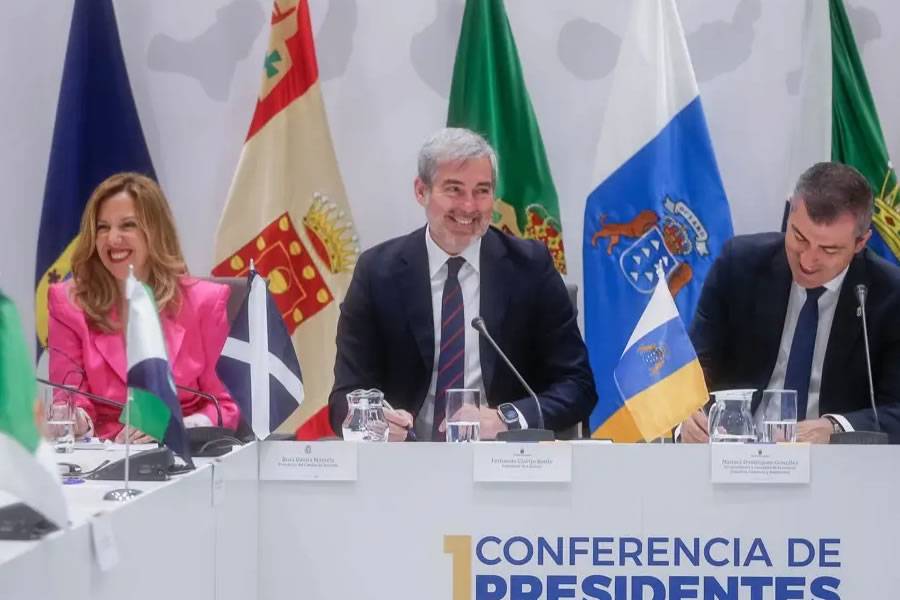Government excludes Ecotax and Tourist Moratorium in plan for economic development
- 21-11-2024
- National
- Canarian Weekly
- Photo Credit: Onda Cero
The Canary Islands Government have outlined their strategic actions to transform the region's economic model, addressing the unique territorial characteristics of each island. However, two significant public demands— the implementation of an ecotax and a tourist moratorium—were notably excluded from the proposed measures aimed at redefining the archipelago's development framework.
During the second Conference of Presidents held in Las Palmas de Gran Canaria, Fernando Clavijo, the regional president, revealed that the archipelago’s 2025 budget allocates €764 million to initiate the implementation of selected measures from the 51 agreed upon by five expert working groups. These groups were established to tackle the islands' challenges over the coming decades. The measures also incorporate 66 citizen contributions and additional proposals from the island councils (cabildos).
Clavijo emphasized the collaboration with the Canary Federation of Municipalities and detailed that out of the €764 million, €97 million are designated for tax incentives related to housing, energy efficiency, and combating climate change.
Exclusion of Ecotax and Tourist Moratorium
When questioned about the exclusion of an ecotax and a tourist moratorium, Clavijo stated that while the need to "limit growth through planning" was recognised, leading to efforts to streamline planning processes, the specific implementation of an ecotax was not addressed. Similarly, although there was consensus on the necessity to manage tourism growth, a formal moratorium was not agreed upon.
Rosa Dávila, the acting president of the Canary Federation of Islands and president of the Cabildo of Tenerife, mentioned that Tenerife currently imposes a fee for visits to certain protected natural areas, such as Masca. She also noted ongoing work on sustainable mobility plans for all islands.
Antonio Morales, president of the Cabildo of Gran Canaria, expressed support for the general concept of an ecotax and a moratorium on activities like holiday rental properties. He highlighted the importance of adapting universal public services to the islands' population realities and tourist growth, emphasizing the need to refine and adjust education to meet new demands.
Focus Areas for Sustainable Development
Experts identified key areas requiring solutions, including immigration, housing, territorial protection, natural spaces, land planning, climate change mitigation, drought management, and energy security. Additionally, Clavijo announced plans to approve a second decree in the first quarter of 2025 aimed at reducing the construction permit issuance timeframe from over two years to between 90 and 180 days.
Clavijo praised the effectiveness of the Canary political model, citing the collaborative efforts of various political parties (CC, PP, PSOE, NC, ASG, and AHI) within the Conference of Presidents to reach agreements beneficial to the archipelago's future.
Criticism and Public Response
Despite these initiatives, criticism persists. Just a week prior, the PSOE criticized the expert panels for not adequately listening to citizens and failing to address significant issues, labelling the meetings as politically charged with insufficient public input. Similarly, the social movement Canarias Palante condemned the expert panels for perpetuating exclusion, arguing that decision-making remains confined to a small group without genuine representation of the populace.
Rosa Dávila reiterated that all proposals to address Canary Islands' demographic challenges will consider each island's specific needs. Islands like La Palma, La Gomera, and El Hierro, along with towns with populations under 10,000, require population retention strategies, whereas other areas face saturation.
Economic Redistribution and Social Equity
Addressing economic disparities, Clavijo highlighted the necessity to improve wealth redistribution within the archipelago. The impoverishment of the middle class, with over 40% of their income allocated to housing, has led to increased social exclusion. The proposed measures aim to alleviate these pressures by enhancing social support systems and ensuring equitable access to essential services.
As the Canary Islands navigate their path towards sustainable development, the exclusion of key measures like the ecotax and tourist moratorium highlights the complex balancing act between economic growth and environmental stewardship. With ongoing debates and legal challenges, the region's future policies will significantly impact its socio-economic landscape and environmental sustainability.
Other articles that may interest you...
Trending
Most Read Articles
Featured Videos
TributoFest: Michael Buble promo 14.02.2026
- 30-01-2026
TEAs 2025 Highlights
- 17-11-2025



























































